Thoughts about Death
Exciting topics and touching moments often appear in our weekly group meetings. Of course, I always cherish those moments but rarely share them in writing. So why do I share it today? Perhaps because sharing it could relieve the heavy feeling of the topic?
Today’s topic, more precisely, one of the topics is about death.
The topic of death started with a question from a group member.
E: What is the difference between someone who wants to suicide due to depression and someone who wants to die of euthanasia?
F: Euthanasia is a rational decision and choice of a person, and a person who commits suicide due to depression is an irrational act under the influence of irrationality.
For example, it is recently reported that the French movie star Alain Delon has decided to end his life by euthanasia. In a TV interview, Anthony, the 86-year-old son of Alain Delon, said that his father had asked for euthanasia, and he decided to support his father. His father is a Swiss citizen, and euthanasia is legal in Switzerland.
E: Once, a family member had cancer, and the doctor gave me a package to help relieve his pain after the surgery. In the package, there was enough morphine to kill a person.
J: In the hospital, doctors always want to save lives. I think that when people in great pain wish to die, such a wish should be respected.
Y: There is a movie called “Amour.” The husband kills his sick wife. I think it is most difficult for the husband.
C: That is true love.
E: What?
C: I mean, he must kill his wife out of love; he does not want her to suffer more.
F: Even though he killed her out of love, I think he must struggle a lot at the same time. There must be many conflicting emotions there.
E: That’s true.
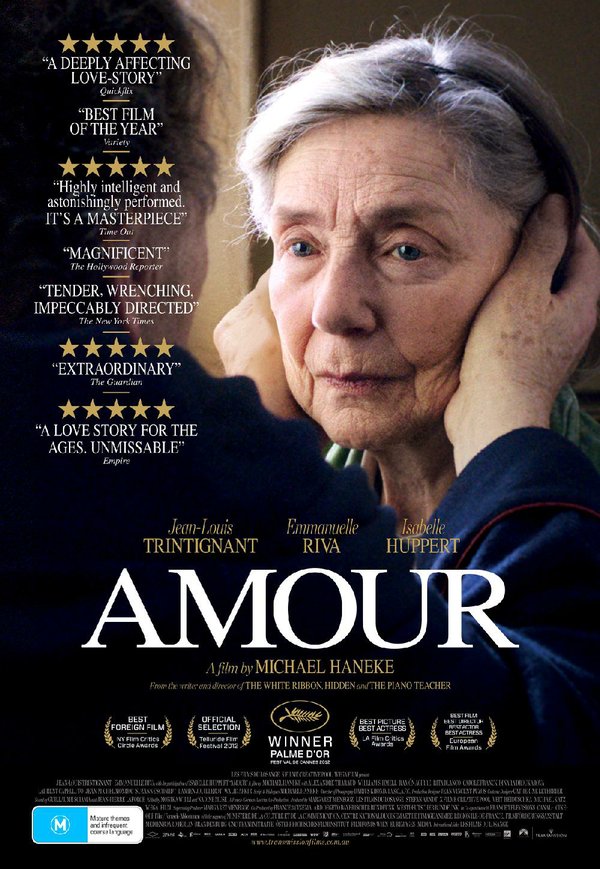
(Picture was found online. Copyright belongs to the original post)
Amour is a 2012 French film. It is about a couple, George and Anne, in their eighties. They both are music professors. They got to know each other at a young age and had a long and happy marriage. They are elegant and intellectual. One day, they were eating breakfast and happily chatting with each other. Suddenly, Anne stared blankly without responding to Georges’ talking or his shouting of her name. After a short time, Anne recovered and had no idea what had happened. Obviously, Anne just experienced a stroke episode. Later on, Anne came home with right-sided paralysis and was wheelchair-bound. It seems she was just discharged from the hospital. Since then, Goerges started to care for Anne’s daily life; for example, he helped her cut her food, use the toilet, and exercise her limbs. Georges himself was a senior man, and it was not easy for him to take care of her. Two lonely seniors living together, the atmosphere of their life was pretty oppressed. Anne asked Georges not to take her back to the hospital anymore. One day, after coming back from a friend’s funeral, he found that Anne had fallen off the wheelchair, and the window was open. It suggests that Anne tried to suicide but failed. Later on, Anne’s stroke got worse; she became incontinent and could not speak anymore. She wanted to end her life now. She refused to take in water and food. When Georges forced her to drink something, she spat it out. Georges slaps her on her face. They both were stunned. They stared at each other silently for a while. Then, Georges took a pillow and put it on Anne’s face……
Then he went out and bought a bunch of flowers. He cleaned and cut the flowers carefully and put the flowers around his wife’s body. He sealed the door and left...
Y: I remember that I read about a Japanese custom in the past. When the parents are old, the children would carry them to the top of the mountain and leave them there to die.
K: It seems called Ubasute, but I am unsure whether it is true.
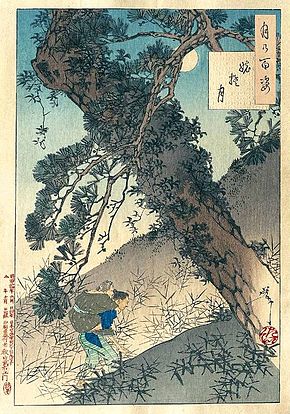
(Picture was found online. Copyright belongs to the original post)
Ubasute, also called Obasute, means “abandoning a parent” or “granny dumpling.” When parents or grandparents are old, they are carried to the top of the mountain and leave them there to die. There is such a story in a Buddhist fable: a son carried his mother to the mountain top. On the way, his mother stretched out her hands, broke the twigs, and scattered them on the ground to mark how they were coming to help her son find his way back home. Here is the poem:
Deep in the mountains,
Why did the mother break the branch?
One after another
It’s not for herself
It’s for her son
F: I remember the similar ancient China custom called “Sending Death Kiln” (寄死窑). When the parent was aged, the son would cut a cave in the mountain for the aged parent. Then he would carry his parent to the cave and leave a small amount of food. The parent would starve to die after eating up the food.
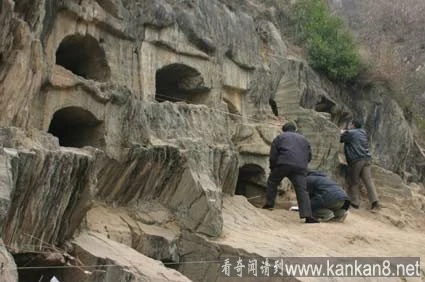
(Picture was found online. Copyright belongs to the original post)
Some records say it is true. In some areas in ancient China, when the parent reached 60 years old, the son would cut a cave in the mountain for the parents. According to the investigation, this custom did exist. More than 40 Sending Death Kilns were found in Guanshan Town in Hubei province of China.
How was the Sending Death Kiln custom ended? Here is a folk story called “Fighting the Rat”: Once upon a time, a person’s father was over 60 already. However, the person could not bear to send his father to the Sending Death Kiln and survived. Later, there was a “Rat Problem”—someone took a cattle-sized rat threatening to destroy their hometown. The person’s father told him that the rats are scared of cats. Therefore, releasing a big cat out could kill the giant rat. So the person did how his father directed him to and killed the rat. Since then, people realized that senior people have wisdom, so they abolished the Sending Death Kiln custom.
Of course, the legend of the giant rat is nonsense. The abolishment of the Sending Death Kiln may be related to the subsequent increase in productivity, which led to the people’s increased ability to support the elderly, and the changes in moral consciousness.
But some people question the actual existence of the Sending Death Kiln. They think the “Sending Death Kiln” is actually the “Sacrificial Kiln” because they are homophonic in Chinese.
In fact, many cultures have the senicide legends, such as Germany (stab and burn), Greece (all people over 60 would commit suicide by drinking hemlock), Rome (throw people over 70 into the river), Inuit (left the elderly on ice to die), Iranian/Scythians (kill and eat the elderly), and Yugoslavia etc. Even though these legends are controversial, killing the elderly and the sick and the phenomenon of euthanasia likely exist in ancient times.
It is said that a type of senicide is still practiced in India. Thalaikoothal is illegal in India, but there is a certain degree of acceptance in India. Some older people also choose to perform Thalaikoothal on them. Therefore, before the Thalaikoothal is performed, relatives and friends will be invited to participate in the ceremony, and no one will report it to the officials afterward. It is said that dozens or even hundreds of such incidents occur in India every year.
Is the Indian people’s acceptance of senicide related to their Buddhism belief? Perhaps because they believe in Samsara, they do not want to suffer the pain caused by illness and age, so they want to enter the next Samsara?
The ancient Greek philosopher Pythagoras (Pythagorean doctrine) believed that the human soul should not be imprisoned in the human body. After the body’s death, the soul can enter another body and live forever. Therefore, ancient Greeks are quite receptive to physical death, including senicide and euthanasia. Only until the Hippocratic oath states saying that no poison can be given even if asked, that one cannot drown a person even if asked, etc. In the Western religions, the former pagans, such as the Greco-Roman Society (pagan religions dominated Greco-Roman society), did not take suicide and euthanasia as a serious problem. However, modern Christians believe that only God can decide your life and death, and if a person commits suicide, he cannot go to heaven.
(Here, I want to clarify that I absolutely support providing help to depressed patients and all the needed ones. Here are only some thoughts about death.)
E: Once, when I was an intern in the hospital, a senior doctor tripped over the monitor line and disconnected the machine for a second. There is a potential danger to cause the patient’s death even though it did not. He felt very guilty about it…
Y: I hope someone could take care of this senior doctor...
F: They said the suicide rate of doctors is very high, 28-40 per 100,000, 2-4 times higher than the general population, which is 12.3 per 100,000. It may be related to their high-stress work. And they need to make life and death decisions. So we can imagine feelings like guilt, self-blame, anger, and struggling in conflictual feelings are not unfamiliar to doctors.
J: when my father died of a heart attack, the attending doctor said that my father passed away without pain, but the young resident cried and told me my father died with pain.
F: If we look at it psychoanalytically, people may feel what they want to feel through the projection and projection identification process and avoid or deny certain feelings they do not want to feel. React to the conscious lever will become the different cognitions and interpretations. Freud said we could not imagine our death. So, it would remain an unknown whether your father felt pain.
C: Why are we talking about death today? It is interesting; next weekend is the long weekend of the Qingming Festival, also called Tomb Sweeping Day in China
J: What is a tomb-sweeping day?
F: Literally, it means sweeping the grave. On the day of Qingming, people would sweep the graves, display the food and flowers in front of the tomb, and burn paper money to pay homage to the dead. They would also express their affection, sometimes loudly, to their loved ones. At the same time, they would also hope for the dead and their ancestors to bless their families with safety, health, and prosperity.
C: That day was also a day of outings and picnics. While remembering the dead, they would also show their love for life.
In the past two years, the COVID-19 virus spread the whole world rapidly. According to statistics (JHU CSSE COVID-19 data and Our World in Data), as of last week, 37,485 people died of COVID-19 in Canada, and 6.12M people died of COVID-18 worldwide.
At this moment, bombs are exploding in the land of Ukrainian, and countless citizens, soldiers, and animals are killed and maimed. Families and loved ones are separated. Would more lives be affected by air pollution and environmental damage? How many more?
Six days ago, on March 21, the China Eastern Airlines plane crashed in Guangxi; 132 lives disappeared instantly. So far, the cause of the plane crash has not been identified. The nation was shocked and mourned. So how many families are affected by this? 132? 264? Or more?
When a butterfly flaps its wings, it will cause a tiny air fluctuation around. But it is impossible to calculate the wing-flap effect because no one would know what other forces would join in. So perhaps nothing would happen. Perhaps it would cause a tornado thousands of miles away? Maybe a tsunami?
Uncertainty causes anxiety. And this is an uncertain era. When will the pandemic end? Whether WWIII or nuclear war would really happen? Would the economy go further downturn? These questions are hovering in the air, and we are also afraid of the manic defenses that are happening and might be happening! Today, a client whose family was affected by the plane crash allowed her tears to stream down her cheeks. Another client’s anxiety causes her dizziness, and another client’s relationship with his girlfriend ended because of the long-term separation due to the pandemic. Also, some of the clients showed a strong need to dominate the sessions because of anxiety. Some of them showed their anger towards uncertainty.
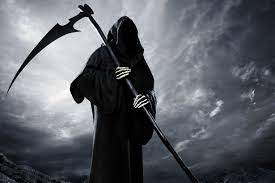
(Picture was found online. Copyright belongs to the original post)
If the devil exists, he has been showing off his power in recent a few years. So, it was not an accident for the topic of death to appear in the group discussion. The denied suppressed fear fueled the topic of death to surface to the group discussion level, even though it still does not become entirely conscious. Defenses such as fantasy, projection, and projection identification were still in play when we discussed it. When death anxiety becomes so strong, it appears as a topic when the death anxiety becomes so strong that we must ease the tension by talking about it. In the group, one of the members just went through surgery; another group member’s loved one is recovering from major surgery; another is worrying the forced quarantine may suddenly occur; the family member of another one just come back from Ukraine; another one is worrying about her illed and lonely aged parents in a country that she cannot go back.
Who did not think of death during the pandemic anyway?
What is death? The dictionary says that death is the act of dying, the end of life, the total and permanent cessation of all the vital functions of an organism. Freud believed that our unconscious does not believe in death; our unconscious believes that we are immortal. He also thinks that we cannot imagine our own death because when we try to imagine it, we are still a bystander. He also believes that when we fear death, we actually fear other things, such as separation, abandonment, loss, sickness, castration, unresolved inner conflicts, etc. Freud also proposed the death drive (death drive or Thanatos) is opposite to the sex drive (sex drive or Eros), it is a destructive force, but not a direct force that drives you to die, such as to commit suicide or kill, but step by step lead to the state of death. When a person is born, in the process of growth, Eros makes the individual grow, and the germline continues. However, Thanatos has also started to play a role, such as the death of cells and aging. Death drive drives life back to the lifeless state, death. And at the moment of death, life starts to appear, such as the bacteria beginning to grow, and the dead organism begins to nourish other lives, e.g., plants and trees. The death drive also shows its effect by preventing creativity and productivity through compulsive repetition, obsessive-compulsive symptoms, and aggression, or by damaging the health through unhealthy eating and lifestyles or unnecessary adventures.
War is the most violent act of aggression and destruction, the extreme manifestation of the collective death drive.
How can a person have no death anxiety in a time as such? Again, death anxiety is anxiety about separation, loss, pain, etc. Therefore, in the group meeting, when one group member mentioned the topic of death, other group members resonated. So, the topic was discussed and perpetuated.
Moreover, this anxiety is still isolated, denied, rationalized, or suppressed by us even when we are talking about it.
As I am writing this (March 27), an article caught my attention and reminded me that poet Haizi (海子,查海生)suicided 33 years ago, on March 26, 1989. Here is Haizi’s most recited verses:
Facing the Ocean, Spring Blossom
Start from tomorrow, to be a happy man
(1989.1.13)
In another poem, he wrote:
Living in the precious world,
The sun shining
The water gently waving
White clouds hovering above
I
Walking on the green grass
Feeling myself is a clean black clay
Living in the precious world
Mud splashing
Up to my cheeks
Living in this precious world
Human is as happy as the plants
Love is as happy as the rain
(1985)
(The translations are all mine.)
From these verses, we can tell he was a poetic man who loved life so much. But death took him away, and the world lost a poetic soul.
If you listen carefully, you can “hear” the deafening explosion of the bombs. Is it right? Let’s cherish life more than anytime else in a non-peaceful world. We psychoanalysts think that when an unconscious becomes conscious, we will gain more control of it. I believe it is true.
Francy Wang
Finished on April 4, 2022, Qingming (Tomb Sweeping Day)
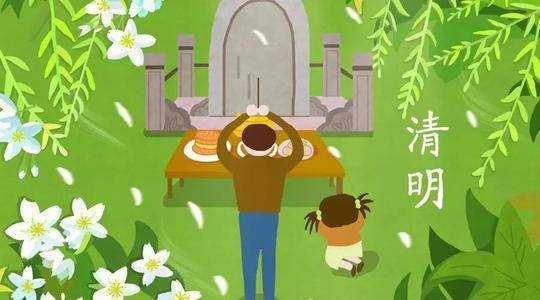
(Picture was found online. Copyright belongs to the original post)
References:
https://www.donga.com/en/article/all/20220321/3262783/1
https://www.republicworld.com/entertainment-news/hollywood-news/alain-delon-iconic-french-actor-decides-to-resort-to-euthanasia-at-86-articleshow.html
https://www.world-today-news.com/actor-alain-delon-86-is-planning-a-euthanasia-he-doesnt-want-to-be-a-helpless-old-man/
Death: https://www.dictionary.com/browse/death
Ubasute: https://en.wikipedia.org/wiki/Ubasute
Senicide:https://en.wikipedia.org/wiki/Senicide
寄死窑:https://baike.baidu.com/item/%E5%AF%84%E6%AD%BB%E7%AA%91/2389177
Anderson, P. (2018). Doctors' Suicide Rate Highest of Any Profession. https://www.webmd.com/mental-health/news/20180508/doctors-suicide-rate-highest-of-any-profession